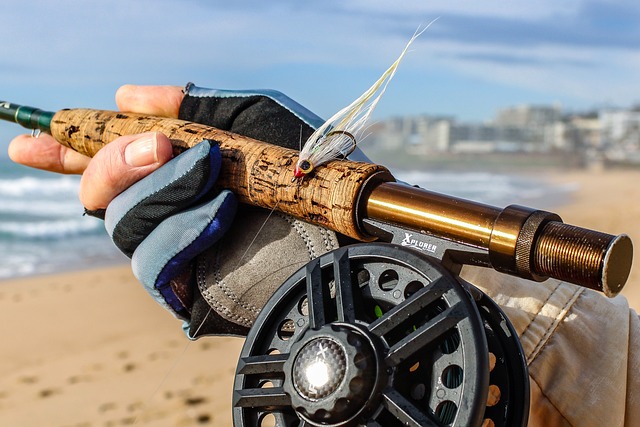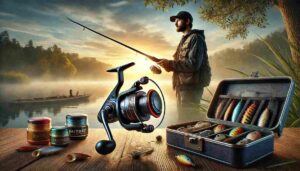Saltwater fly fishing is a popular sport that requires specialized equipment, including a saltwater fly rod. The fly rod is a crucial tool in this type of fishing, and its weight is a significant factor to consider. Choosing the right fly rod weight is essential for successful saltwater fly fishing, as it affects casting distance, accuracy, and the ability to handle the challenges of the sport. In this post, I will explore the significance of fly rod weight in saltwater fly fishing, how to choose the right weight, and its relationship with fly line weight.
What is fly rod weight?
Fly rod weight refers to the measure of the strength or power of a fly rod. It is typically denoted by a number ranging from 1 to 14, with 1 being the lightest and 14 being the heaviest. This weight classification system is standardized across the fly fishing industry, allowing anglers to choose the appropriate rod for their fishing needs.
The weight of a fly rod is determined by the diameter and stiffness of the rod’s blank, as well as its length and taper. A heavier fly rod is more powerful and can handle larger fish, heavier lines, and more challenging fishing conditions, while a lighter fly rod is more delicate and suited for smaller fish and more subtle presentations.
Why is fly rod weight important in saltwater fly fishing?
Fly rod weight is especially important in saltwater fly fishing because the challenges of the sport require specialized equipment that can handle the conditions and species found in saltwater environments. A properly weighted fly rod can help an angler cast farther, with more accuracy, and better control the fly in the wind and waves.
In saltwater fly fishing, anglers often target larger and stronger fish, such as tarpon, bonefish, and permit, that require a more substantial and powerful rod to handle the fight. Choosing the right fly rod weight for the target species and fishing conditions is critical for success in saltwater fly fishing. A heavier rod weight can also help an angler to cast larger and heavier flies, which are often used in saltwater fly fishing.
How to choose the right fly rod weight for saltwater fly fishing
Choosing the right fly rod weight for saltwater fly fishing depends on several factors, including the target species, wind conditions, and fly size. Here are some steps to consider when selecting the appropriate fly rod weight:
- Determine the target species: The size and strength of the fish you are targeting will dictate the necessary rod weight. Larger and stronger fish, such as tarpon or sailfish, require a heavier rod weight, while smaller fish, such as bonefish or redfish, can be caught with a lighter rod.
- Consider the wind conditions: Saltwater fly fishing often involves fishing in windy conditions, which can make casting challenging. A heavier rod weight can help cut through the wind and deliver the fly to the target.
- Evaluate the fly size: The size and weight of the fly you plan to use will also impact the rod weight needed. Larger flies require a heavier rod weight to cast effectively, while smaller flies can be cast with a lighter rod.
- Test the rods: Try casting several different rod weights to determine which feels most comfortable and suits your casting style.
- Seek expert advice: Consult with a knowledgeable fly fishing guide or professional to help determine the appropriate rod weight for your specific fishing situation.
In general, popular fly rod weights for saltwater fly fishing include 8wt, 9wt, and 10wt rods. Anglers should select the appropriate weight based on the specific factors mentioned above to ensure successful saltwater fly fishing.
Fly rod weight and fly line weight
Fly rod weight and fly line weight are closely related and play a significant role in saltwater fly fishing. In general, the weight of the fly line should match the weight of the fly rod for optimal performance. Here are five important points to consider when matching fly rod weight and fly line weight:
- Weight standards: The weight of the fly line is also standardized, ranging from 1 to 14, with matching numbers to the fly rod weight. A 9wt fly line should be paired with a 9wt fly rod.
- Taper design: Fly line weight is also impacted by its taper design. A heavier fly line can be designed with a more aggressive taper to help load a heavier fly rod and deliver larger flies.
- Casting performance: Matching fly line weight and fly rod weight is critical for casting performance. An improperly weighted line or rod can result in poor casting distance, accuracy, and control.
- Conditions and species: The target species and fishing conditions should also be considered when matching fly rod and fly line weight. Windy conditions may require a heavier line to help cut through the wind and deliver the fly to the target.
- Personal preference: Ultimately, personal preference and casting style may also play a role in matching fly rod and fly line weight. Some anglers may prefer a slightly heavier or lighter line for their specific casting style.
Matching fly rod weight and fly line weight is crucial for successful saltwater fly fishing. Consult with a professional or test several different line and rod combinations to determine the best match for your specific fishing situation.
Conclusion
In conclusion, fly rod weight is a critical factor in saltwater fly fishing, as it impacts casting distance, accuracy, and the ability to handle the challenges of the sport.
Choosing the right fly rod weight requires considering the target species, wind conditions, and fly size. Popular fly rod weights for saltwater fly fishing include 8wt, 9wt, and 10wt rods, and selecting the appropriate weight ensures optimal performance.
Fly line weight should also match the fly rod weight for optimal casting performance. Matching fly rod and fly line weight, along with considering the fishing conditions, species, and personal preference, is crucial for successful saltwater fly fishing. With the right equipment and techniques, anglers can enjoy a thrilling and rewarding experience in the world of saltwater fly fishing.










